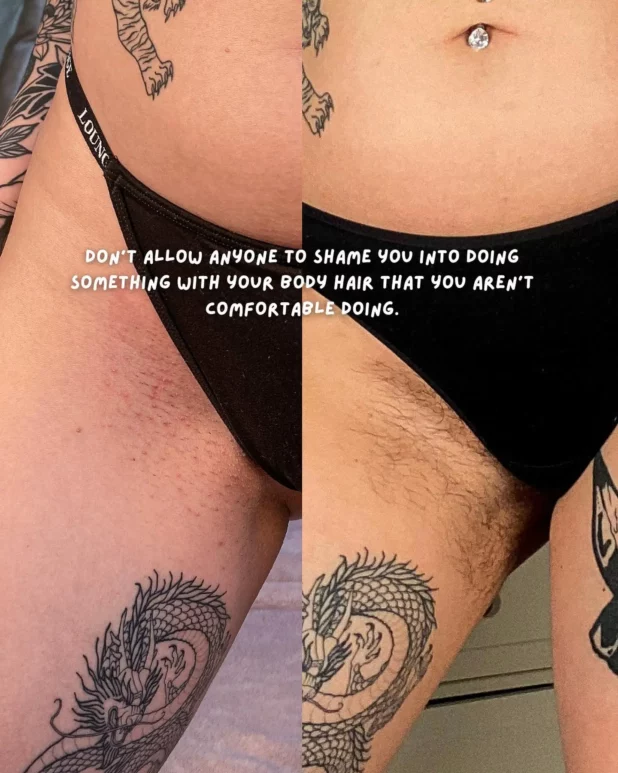Oh, so you thought there was something women wouldn’t do, because it was just too vulgar?
Well, I got news for ya, bud.
Women aren’t just burning their bras. In 2023 they are breaking up with their waxers and throwing out their razors.
A trend has emerged online of women rallying against the idea that they should have to hide their pubic hair at the beach – or at all.
It has long been the social norm that women are expected to conceal their pubic hair at all costs, seriously a vagina wax in Australia will set you back at least $50.
No pubic hair on women has become so normal that is extremely rare to see female pubic hair in mainstream pop culture.
You’d struggle to find a famous sex scene where a woman’s pubic hair has been featured.
The elimination of female pubic hair in mainstream culture has also led to common misconceptions like, for instance, that pubic hair is somehow dirtier: not true.
Psychologist Carly Dobers said that pubic hair has become so taboo that if women don’t hide it, it is seen as a form of “self-expression,” and a “radical act.”

Carly Dobers, pubic hair expert
“The cultural messaging has been ‘women should not have pubic hair.’ It is a normal, healthy part of the human body,” she told news.com.au
…
“Pubic hair maintenance has historically been recommended by beauty outlets with keeping a sexual partner interested in mind or mimicking the look of mainstream pornographic actors,” she said.
Pubic hair has become so sexualized that has just become the norm for it to be removed, but the hairy conversation has taken a turn thanks to influencers.
Influencers Sara Puhto and Bella Davis posted a joint post of the pair in bikinis on Instagram.
You also could see visible pubic hair poking out from their bikini bottoms.
The post quickly raised chatter about beauty standards and hygiene.
Puhto shared the post with her 400,000 followers and explained that, while she understood it was a personal choice to shave or wax, she wants women to realize they don’t need to alter their bodies.
“You don’t owe anyone a smooth bump-free hairless body! Don’t let your body hair or razor bumps hold you back from wearing a bikini, from being intimate, or from making precious memories,” she preached.
Women are so disgusting in so many different ways, it is difficult to catalog. However, let’s focus in on the fact that they are obsessed with this idea that they should only do something if they “owe it” to someone. This is an interesting psychological phenomenon to observe from a male perspective, as we certainly do not think in these terms. In fact, the terms are deeply offensive.
A man has a concept of “self-respect” (alternatively, you might say “dignity”). He views himself through this lens and views others through the same lens. A man doesn’t go out in public looking disgusting, or stinking, or whatever, because this would be an affront to his sense of self-respect. If a man sees another man looking like a slob, smelling badly, or doing some other socially offensive action, he says “that man clearly has no self-respect.”
Now, imagine that you do not have a sense of self-respect, and your entire relationship to society is based on feeling like you owe other people certain things. This is what it is like to be a woman. Because of this, women will reframe various anti-social behaviors in terms of “not owing other people anything.”
It’s a strange twist, and difficult to grasp. I agree that you do not owe strangers in society anything, but I would never allow this perception to cause me to engage in public anti-social displays, because I feel I owe it to myself to behave with dignity.
Do you see the insight here? Not only does it say something about how women view themselves and their relationship to society (as a series of cumbersome obligations); it says something about how they view themselves. Most importantly, it shows how easy it is to break the social bonds for a woman. If she sees others doing something anti-social, she is then able to tell herself that she does not “owe” the pro-social behavior to society. This lack of self-respect dynamics means a woman can be convinced to do anything through changing social stigmas.
What these women on social media are doing is breaking down social stigmas. We have seen this with less weird things than “flaunt your public hair” throughout the history of women in public society. They do not make themselves presentable in any way because they decide they don’t “owe” it to anyone. They smoke and curse because they don’t “owe” ladylike behavior. They get bulbously fat because there is no debt.
It is worthwhile to observe women, and to note these behavioral differences.




